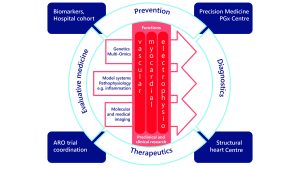Clinical research that changes patients’ lives: From genomics and mechanisms to clinical trials and practice.
MHI’s Research Centre is composed of approximately 700 people, including basic and clinical researchers, who author more than 700 scientific articles per year.
Innovation is at the core of our mission
The missions of the Research Centre of the Montreal Heart Institute (MHI) are to:
- Make major discoveries in the cardiovascular field that will ultimately contribute to the improvement of patient care and population health.
- Contribute to the advancement of knowledge in the cardiovascular field.
- Provide an exceptional environment for the training of highly qualified personnel.
- Ensure the transfer and application of knowledge to improve patient care and population health.
The focus of our research on important cardiovascular problems, as well as the balance and synergy between basic and clinical research, are demonstrated by our flagship projects and our research matrix composed of main (vertical) scientific axes and cross-sectional approaches (Fig. 1). This synergy between clinical and basic research results in a model of translational and bidirectional research going from the study of genes to large-scale clinical trials and from the patient to fundamental studies.

Cutting-edge research approaches, infrastructures and platforms
We have developed and integrated cutting-edge cross-sectional scientific approaches (e.g. genomics and pharmacogenomics (PGx), proteomics, metabolomics, discovery and development of biomarkers, the study of important processes (e.g. inflammation), state-of-the-art medical and molecular imaging) with the development of major research platforms including:
- A hospital cohort of 20,000 finely phenotyped and genotyped patients.
- A coordinating centre for clinical trials (phases 1 to 4) with an international reputation.
- A GLP-grade Pharmacogenomics Centre (CAP-CLIA certified).
- Exceptional platforms for the discovery, development and validation of biomarkers.
- Medical and molecular imaging platforms for pre-clinical and clinical research.
- A large-scale bank of medical images fed by more than 200 clinical centres. We also lead large-scale clinical trials and clinical research networks, thus underscoring our multiple national and international partnerships.
Our Centre targets these main strategic perspectives in accordance with its missions and assets:
- Cardiovascular precision medicine
- Cardiovascular flagship projects
- Innovative clinical trials
- Cutting-edge cardiovascular imaging.
Cardiovascular precision medicine
Our cardiovascular precision medicine initiative was launched in 2004 and aims to discover, develop and validate precision therapies guided by different approaches, including pharmacogenomics, diagnostic genetic and non-genetic biomarkers, and biomarkers for the stratification of cardiovascular risks.
Our initiative benefits from a critical mass of researchers in genomics, statistical genetics, pharmacology, metabolomics and bio-informatics; our Pharmacogenomics Centre; our statistical genetics group StatGen; our Centre of Excellence in Personalized Medicine (CEPMed), our platforms for the discovery of biomarkers, our hospital cohort, and funding totalling $500m for precision medicine targeting pharmacogenomics, proteomics, metabolomics, microbiomics, and artificial intelligence.
Cardiovascular flagship projects
Our Centre’s flagship projects target important cardiovascular problems and require the expertise of multi-disciplinary groups working at the Montreal Heart Institute and supported by major technological and financial resources:
Curb atherosclerosis
This is an ambitious programme aiming to reduce the burden of atherosclerotic cardiovascular events by the identification of patients at risk or with early coronary disease, by improved evaluation of risk through the utilisation of biomarkers in development, and by the development of new treatment approaches involving pharmacogenomics, drug repurposing, and new therapeutic targets and medications. Various projects target inflammation, lipoproteins, diabetes, and lymphatic vessels.
Target brain-heart interactions
This is a project holding the potential of fundamentally changing our understanding of these interactions. This project encompasses several types of brain-heart interactions. Ultimately, these project studies aim at allowing for the development of new therapeutic tools to slow or prevent cardiovascular and brain diseases.
Optimise the treatment of heart failure
This is a project based on the Canadian Alliance in Heart Failure led by the Montreal Heart Institute with the objective of improving the prediction, prevention, diagnosis and management of heart failure. The four targets of the translational research subgroup of the network are the following:
- New biological pathways, heart failure phenotypes and targeted therapies.
- Inflammation in heart failure.
- Nutritional and environmental exposome.
- Ageing, co-morbidities and heart failure.
Cure broken hearts
This project targets patients with congenital heart diseases and aims to improve their survival through excellence in research, care and teaching. The research objectives include:
- Identifying the genetic and non-genetic causes of heart failure.
- Developing experimental models to understand the roles of scar tissue, hypoxic areas, and ionic channel abnormalities in arrhythmias and sudden cardiac death.
- Developing minimally invasive, hybrid, and image-guided approaches to treatment.
- Identifying populations at risk of sudden death through population studies that include genotype-phenotype correlations, proteomic analyses, imaging, and electrophysiological evaluations.
- Conducting clinical trials to evaluate strategies for preventing sudden death, as well as pharmacological and interventional therapies for heart failure.
Innovative clinical studies
We lead at MHI innovative clinical studies:
- Multicentre studies integrating pharmacogenomics, biomarkers used to stratify populations, and multi-modality imaging.
- Clinical trials utilising adaptive designs.
- Decentralised (or virtual) clinical studies.
Our Academic Research Organization (ARO) possesses all the required expertise and services for the coordination of clinical trials, as well as a network of 4,500 clinical sites in 35 countries. The synergies between our ARO and our Pharmacogenomics Centre allow the Research Centre of the Montreal Heart Institute to take an international leadership role in clinical studies focused on precision medicine. Furthermore, our ARO is a world leader in decentralised clinical trials (with no visits to the hospital or clinic) with the development of our platform called MeTRO and the conduct of the largest decentralised trial called COLCOT-T2D.
Please note, this article will also appear in the 20th edition of our quarterly publication.









